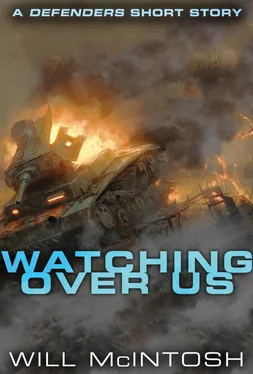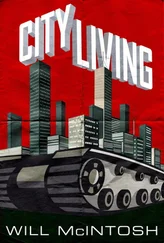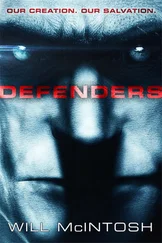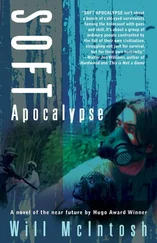* * *
The line slowed. Laurel caught her foot on a railroad tie, nearly fell. Ahead, the way forward was blocked by a pile of broken machinery. They were on a trestle, thirty feet above a stream, so the platoon was forced to climb over the debris.
When it was her turn, Laurel picked her way carefully over jagged, crushed steel.
“Drones,” Todd said. “They’re all drones.”
That’s exactly what they were: walking artillery pieces, designed to wander randomly, seeking Luyten through VRE technology. Luyten couldn’t read their computer-chip minds, so they couldn’t avoid their gunfire the way they did humans’ gunfire. The problem was, once the Luyten knew where one of the drones was, it wasn’t difficult to take out a machine. They could have more easily pulled up railroad ties to block the route, or simply burned it; the barricade was meant to be a message about the drones’ lack of effectiveness, a morale stomper to any soldiers passing through. Beyond the blockade the track veered deeper into pine forest.
A cry of alarm rose from up the line. Laurel swung her rifle off her shoulder and pointed it into the trees, looking for bright colors. Cobalt blue, magenta, emerald, mustard…
A huge figure broke from the trees, clutching a rifle the size of a bazooka. It was manlike, but not a man: deep-set eyes, a ridged brow, skin as white as bone, black uniform. He had three legs, which made him fast. So fast.
The entire platoon gaped, struck dumb by the sight of the creature as it headed north on the tracks, eyes straight ahead, exhaling through its nose like a winded colt.
Three more burst from the trees; then there were six, then ten, as more appeared farther up the track.
Cheers rose in the platoon, growing to a full-throated roar as, one by one, the giants disappeared around a curve in the track.
Lieutenant Carter was squatting, on her walkie-talkie, a finger plugging her free ear. Everyone was talking at once, chattering excitedly, their faces more animated than Laurel had ever seen them.
“I told you,” Sergio said. “Didn’t I tell you?”
Standing, Carter waved for silence. She was smiling, almost glowing. “Ladies and gentlemen, we’ve just met our new allies. They’re called the defenders.”
Through her icy shock, Laurel couldn’t help wondering how these defenders would turn the tide of the war. As Todd had pointed out, this wasn’t wrestling. Weren’t they simply larger targets?
* * *
At lunchtime they caught up with the defenders, who were leaning up against trees eating processed meat that looked like huge cubes of spam. Laurel’s platoon stood at a distance, whispering.
Laurel marveled at their size, the slabs of muscle bulging beneath their skintight uniforms. How on earth had they been created? They were walking miracles, far beyond what Laurel thought humans were capable of engineering. She wondered if people had thought the same about the A-bomb back in 1945. When your survival depended on it, great strides could be made in a short time.
One of the defenders waved them on. “You’re giving away our position. Move on.”
“We just want to say, ‘Welcome,’” Lieutenant Carter called. “We’re glad to have your help.”
“Just stay out of our way,” the defender said. His uniform sported vertical silver striping on the shoulders, but if it indicated his rank, Laurel couldn’t decipher it. He clearly thought he outranked Lieutenant Carter.
“Let’s move out,” Carter called, waving them forward.
They walked on, the defender’s words echoing in Laurel’s head.
You’re giving away our position .
How would saying hello give away these defenders’ position to the Luyten? If any Luyten were within eight miles, they’d already know where the defenders were. Unless…
“ That’s it ,” Laurel shouted. The Luyten couldn’t read the defenders’ minds. That, after all, was the Luyten’s only advantage. They were outmanned, outgunned, in foreign territory, but they knew their enemy’s every move. If that advantage were neutralized…
Laurel’s heart thumped wildly as she explained her hunch.
* * *
They crossed a backwoods country road, passed a tall peanut-processing machine—four tubes snaking into cylindrical tanks. Past that were open fields on either side.
Although it made no sense, because the Luyten didn’t rely on their eyes to detect people, Laurel felt exposed as they walked in the open. She preferred having forest pressing tight on both sides. A mile on they hit a town. The tracks ran behind what passed for the main street—a dozen or so two-story buildings.
“If Laurel’s right, the starfish don’t stand a chance,” Jared was saying. He was walking up on his toes, head up like he could walk a thousand miles.
Down the crossing street, Laurel caught a glimpse of movement out of the corner of her eye. She spun, pointed her rifle, was about to sound the alarm when she saw they were people. Two women, hurrying four young children along the sidewalk, each carrying an overstuffed backpack. Laurel was shocked to see people so far into enemy territory.
“Lieutenant?” she called, pointing. “People.”
Lieutenant Carter paused, squinted at the little group. “Why don’t you take someone with you and check in with them, make sure they don’t need help? We’ll wait.”
“Yes, ma’am.
“Jared, come on,” Laurel called. Jared trotted after her.
“Hello,” Laurel said as she approached the group. The women greeted Laurel with cautious smiles. One was youngish, limping on a bad leg. The other was Laurel’s age, maybe a little older. The children were hollow-eyed, somewhat malnourished.
“I didn’t know anyone was still living this far outside the cities,” Laurel said.
“There are a few of us,” the younger woman said. “Not many.”
“Don’t you want to move somewhere safer?” Jared asked.
“There’s nowhere safer,” the older woman said. “We heard the starfish don’t necessarily go out of their way to kill children. So we keep our heads down, mind our own business. So far it’s worked.”
There was a certain logic there. They were taking a risk, but who wasn’t?
“No offense, but we’d rather you all just go on your way before you draw their attention,” the older woman said.
That hadn’t occurred to Laurel. As soldiers, they had targets on their backs, and here they were getting up close to children. “I’m sorry.” She headed toward her platoon. “We’ll be gone before you know it.”
Laurel got the Lieutenant’s attention, motioned that they could start walking and that Laurel and Jared would catch up. The Lieutenant lifted her hand to give Laurel a thumbs-up just as her uniform burst into flames. Her helmet melted over her face.
Before the Lieutenant’s blackened body dropped to the tracks, the heat gun hit Pete Casing. He’d opened his mouth to shout some order, but was burned before he could get it out.
Troops fled in all directions, clutching their rifles. With Jared at her heels, Laurel took cover in the doorway of a paint store.
The bark of rifle fire and adolescent screams rang out as three, four soldiers dropped, charred to stumps.
Shaking, panting, Laurel scanned the buildings, trying to locate the enemy.
A glimpse of bright emerald flashed in a second-story window across the street. As soon as she saw it, it was gone. The Luyten knew she’d seen it.
Laurel leaped up, pulled a grenade from her belt, intending to toss it in the window before the thing could escape. As she hefted it, she realized there was no way she could reach that window. She pushed the grenade at Jared, pointed.
Читать дальше












